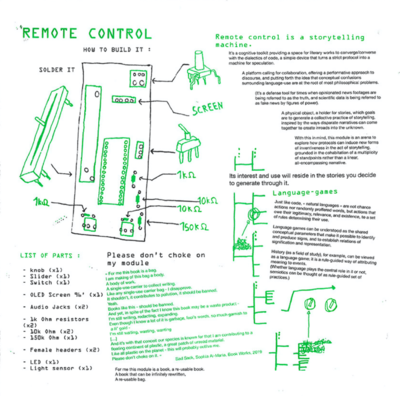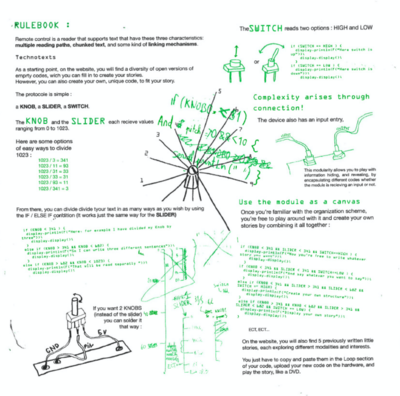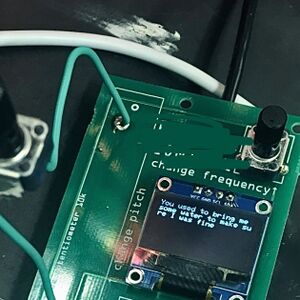User:Claxhanson/Materialising the blackbox: Difference between revisions
Claxhanson (talk | contribs) No edit summary |
Claxhanson (talk | contribs) No edit summary |
||
| (27 intermediate revisions by the same user not shown) | |||
| Line 1: | Line 1: | ||
[[Category:LFP]] | |||
= | =Remote Control= | ||
<br> | <br> | ||
[[File:Remoterecto.png|400px|frameless|right]] | |||
<span style="color:green;letter-spacing:1px;font-size:20px;font-family:Papyrus;">Remote control is a storytelling machine.</span> <br><br> | |||
It’s a cognitive toolkit providing a space for literary works to converge with the dialectics of code. | |||
It’s a simple device that turns a strict protocol into a machine for speculation. <br><br> | |||
A platform offering a performative approach to discourse, putting forth the idea that conceptual confusions surrounding language-use are at the root of most philosophical problems. <br><br> | |||
(It’s a defense tool for times when opinionated news footages are being referred to as the truth, and scientific data is being referred to as fake news by figures of power). <br><br> | |||
A physical object, which goals are to generate a practice of storytelling, inspired by the ways disparate narratives can come together to create inroads into the unknown (or the obvious).<br><br> | |||
With this in mind, this module is an arena to explore how protocols can induce new forms of inventiveness in the act of storytelling, grounded in the cohabitation of a multiplicity of standpoints, rather than a linear, all-encompassing narrative. | |||
Its interests and uses will reside in the stories you decide to generate through it.<br><br> | |||
<span style="color:green;letter-spacing:1px;font-size:30px;font-family:Papyrus;">LANGUAGE GAMES :</span><br> | |||
Just like code, « natural languages » are not chance actions nor randomly proffered words, but actions that owe their legitimacy, relevance, and existence, to a set of rules determining their use.<br><br> | |||
Language games can be understood as the shared conceptual parameters that make it possible to identify and produce signs and to establish relations of signification and representation.<br><br> | |||
History (as a field of study), for example, can be viewed as a language game: it is a rule-guided way of attributing meaning to events.<br><br> | |||
(Whether language plays the central role in it or not, semiotics can be thought of as a rule-guided set of practices.)<br><br> | |||
[[File:Remoteverso.png|400px|frameless|left]] | |||
<span style="color:green;letter-spacing:1px;font-size:30px;font-family:Papyrus;">RULEBOOK :</span><br> | |||
Remote control is a reader that supports texts that have these three characteristics: multiple reading paths, chunked text, and some kind of linking mechanisms.<br><br> | |||
Technotexts<br> | |||
Use the module as a canvas<br><br> | |||
The protocol is simple :<br> | |||
a KNOB, a SLIDER, a SWITCH.<br><br> | |||
The KNOB and the SLIDER each receive values ranging from 0 to 1023.<br> | |||
The SWITCH reads two options: HIGH and LOW. <br> | |||
From there, you can divide your text in as many ways as you wish by using the IF / ELSE IF condition<br><br> | |||
On this website, you will find a diversity of open versions of empty codes, which you can fill in to create your own stories.<br> | |||
However, you can also create your own, unique code, to fit your story. You will also find 5 previously written little stories, each exploring different modalities and interests. You just have to copy and paste them in the Loop section of your code, upload your new code on the hardware, and play the story, like a DVD.<br><br> | |||
<div style="background:#e6ffcc"> | |||
==⇨ https://www.deplayer.nl/releases/dob-101-0 ⇦== | |||
==⇨ https://www.deplayer.nl/events/de-player-experimental-publishing-xpub-present-inputoutput ⇦== | |||
</div> | |||
===First sketch for introduction text - 27/11/19=== | |||
<br> | <br> | ||
'''#'''define The '''modular synthesizer''' is a type of synthesizer consisting of separate specialized modules. The modules can be connected in various ways, their outputs contributing to the overall function of the system. <br> | |||
<br> | <br> | ||
'''#'''define A '''BlackBox''' is a complex system or device whose internal workings: circuits (hardware), and codes (software), are hidden. <br> | |||
<br> | <br> | ||
'''void''' setup() { <br> | |||
<br> | <br> | ||
With these notions as a point of departure, ''Tales from another module'' is the interfaith marriage between 10 unique modular contributions, the interface between ten different fields of research, coming together/emerging as the result of a trimester-long investigation around the paradigm of modularity. <br> | |||
<br> | <br> | ||
With the smell of solder resin floating in the air and the soft sound of our computers overheating, we delved ourselves into the worlds of soldering, fritzing, and C++ writing, in an attempt to demystify what once could have been seen as an esoteric practice. <br> | |||
<br> | <br> | ||
As each single module can perform one job and one job well, they all explore the variety of ways through which they can anticipate (or sometimes require) the output of another module, to coexist in a versatile, collaboratively built landscape; an organism in which ideas interact to create new narratives that complement (or sometimes depend on) each other. | |||
<br> | <br> | ||
}<br> | |||
<br> | <br> | ||
'''void''' loop() { <br> | |||
<br> | <br> | ||
The following pages are a compilation of our research and resulting work, complete with instructions of assembly and use. Giving insight to the black box as a call of duty, it consists of individual manuals translating this complex architecture into an explicit, detailed set of programs and connections, in pair with pre-designed PCB boards : to be built, programmed, and connected, for anyone to partake in this poised riot of sounds, scenes, and tales. <br> | |||
<br> | <br> | ||
See more, (and find open-source access to the codes) on the website: | |||
https://issue.xpub.nl/10/ | |||
<br> | <br> | ||
}<br> | |||
<br> | <br> | ||
Cheers, Xpub1 2019 | |||
[[File:You used to bring me water.jpg|300px|frameless|right]] | |||
Latest revision as of 00:08, 20 April 2020
Remote Control
Remote control is a storytelling machine.
It’s a cognitive toolkit providing a space for literary works to converge with the dialectics of code.
It’s a simple device that turns a strict protocol into a machine for speculation.
A platform offering a performative approach to discourse, putting forth the idea that conceptual confusions surrounding language-use are at the root of most philosophical problems.
(It’s a defense tool for times when opinionated news footages are being referred to as the truth, and scientific data is being referred to as fake news by figures of power).
A physical object, which goals are to generate a practice of storytelling, inspired by the ways disparate narratives can come together to create inroads into the unknown (or the obvious).
With this in mind, this module is an arena to explore how protocols can induce new forms of inventiveness in the act of storytelling, grounded in the cohabitation of a multiplicity of standpoints, rather than a linear, all-encompassing narrative.
Its interests and uses will reside in the stories you decide to generate through it.
LANGUAGE GAMES :
Just like code, « natural languages » are not chance actions nor randomly proffered words, but actions that owe their legitimacy, relevance, and existence, to a set of rules determining their use.
Language games can be understood as the shared conceptual parameters that make it possible to identify and produce signs and to establish relations of signification and representation.
History (as a field of study), for example, can be viewed as a language game: it is a rule-guided way of attributing meaning to events.
(Whether language plays the central role in it or not, semiotics can be thought of as a rule-guided set of practices.)
RULEBOOK :
Remote control is a reader that supports texts that have these three characteristics: multiple reading paths, chunked text, and some kind of linking mechanisms.
Technotexts
Use the module as a canvas
The protocol is simple :
a KNOB, a SLIDER, a SWITCH.
The KNOB and the SLIDER each receive values ranging from 0 to 1023.
The SWITCH reads two options: HIGH and LOW.
From there, you can divide your text in as many ways as you wish by using the IF / ELSE IF condition
On this website, you will find a diversity of open versions of empty codes, which you can fill in to create your own stories.
However, you can also create your own, unique code, to fit your story. You will also find 5 previously written little stories, each exploring different modalities and interests. You just have to copy and paste them in the Loop section of your code, upload your new code on the hardware, and play the story, like a DVD.
⇨ https://www.deplayer.nl/releases/dob-101-0 ⇦
⇨ https://www.deplayer.nl/events/de-player-experimental-publishing-xpub-present-inputoutput ⇦
First sketch for introduction text - 27/11/19
#define The modular synthesizer is a type of synthesizer consisting of separate specialized modules. The modules can be connected in various ways, their outputs contributing to the overall function of the system.
#define A BlackBox is a complex system or device whose internal workings: circuits (hardware), and codes (software), are hidden.
void setup() {
With these notions as a point of departure, Tales from another module is the interfaith marriage between 10 unique modular contributions, the interface between ten different fields of research, coming together/emerging as the result of a trimester-long investigation around the paradigm of modularity.
With the smell of solder resin floating in the air and the soft sound of our computers overheating, we delved ourselves into the worlds of soldering, fritzing, and C++ writing, in an attempt to demystify what once could have been seen as an esoteric practice.
As each single module can perform one job and one job well, they all explore the variety of ways through which they can anticipate (or sometimes require) the output of another module, to coexist in a versatile, collaboratively built landscape; an organism in which ideas interact to create new narratives that complement (or sometimes depend on) each other.
}
void loop() {
The following pages are a compilation of our research and resulting work, complete with instructions of assembly and use. Giving insight to the black box as a call of duty, it consists of individual manuals translating this complex architecture into an explicit, detailed set of programs and connections, in pair with pre-designed PCB boards : to be built, programmed, and connected, for anyone to partake in this poised riot of sounds, scenes, and tales.
See more, (and find open-source access to the codes) on the website:
https://issue.xpub.nl/10/
}
Cheers, Xpub1 2019



